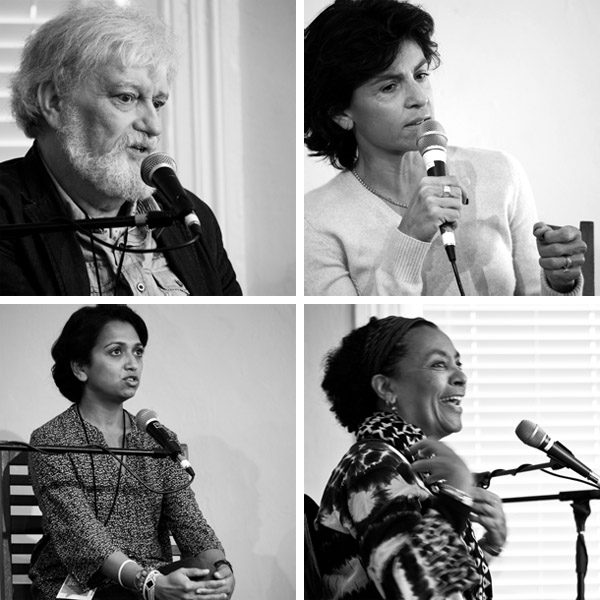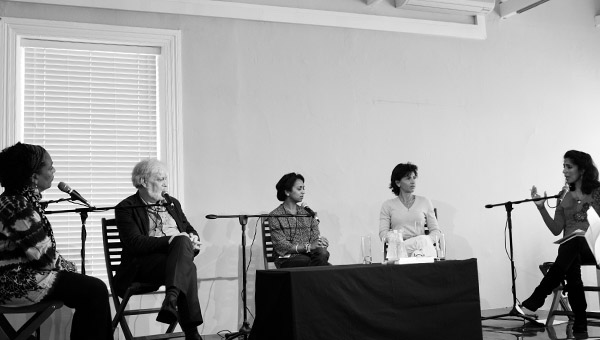Etonnants Voyageurs: Story Tellers and Travel Writers, 23 September 2012, Fugard First
DANSON KAHYANA

Clockwise from top left: Georges-Olivier Chateaureynaud, Anne Nivat, Veronique Tadjo and Natacha Devi Pathareddy Appanah
Attended by about 40 people, this session featured Georges-Olivier Chateaureynaud (a French novelist and short story writer known for his realist style), Anne Nivat (a freelance war author), Nathacha Devi Pathareddy Appanah (a Mauritian author living in France), and Veronique Tadjo (Ivorian novelist, academic and author of children's books).
Asked how they “discovered” their writing talent, the writers had interesting things to say. Chateaureynaud discovered his storytelling talent at school where he served as a griot to his classmates.
Appanah discovered that the friends she shared her childhood stories with found them interesting. This made her look at her history anew, and to try representing it through fiction.
Nivat started writing about war when she was caught in a war zone, Chechnya. Because she had no way of leaving, she decided to cover the war.
As to what they write and why they write it, the writers gave different reasons. “When I write, I want to grasp how people cope with war, how they manage to be hospitable even when the war is raging on,” Nivat revealed.
Tadjo's passion is “to show how love survives amidst troubles, wars, and genocide” – a sentiment that brings to mind “Somehow we Survive” – a poem by departed South African poet, Denis Brutus, which portrays how tenderness survives even as a ferocious fascist regime destroys the country.
Tadjo told the audience she wrote In the Shadow of Imana after a visit to post-genocide Rwanda. “I had Ivory Coast in mind when I was writing this book,” she revealed, pointing out that the concept “Ivorité”, used by politicians such as former president Laurent Gbagbo to distinguish between pure and non-pure Ivorians, was something akin to the ethnic extremism that had driven Hutus to kill Tutsis in Rwanda.

Tadjo, Chateaureynaud, Appanah, Nivat and the Chair at Etonnants Voyageurs
Chateaureynaud said he wrote for people who would understand what he was talking about. “I would love to write for the whole universe,” he said, “but this is impossible because we write for people who resemble us, people who share our memories and our cultures. Literature is not universal; it is almost universal.”
On the question of setting, Appanah argued that a writer did not have to set his or her book in a place where he or she was born. “I can set my book anywhere, even Siberia, as long as I feel I know that place quite well,” she said. “Because I am Mauritian, people expect me to set my books in Mauritius. I refuse this,” she said, with some vehemence.
 SLiPStellenbosch Literary Project
SLiPStellenbosch Literary Project